The Nature Conservancy Receives $1.25 Million from Lockheed Martin Corporation to Support Climate Resiliency Projects
Media Contacts
-
Kathleen McFadden
Media Relations Manager
The Nature Conservancy
Phone: 610-368-7108
Email: k.mcfadden@tnc.org
The Nature Conservancy (TNC) today announced a $1.25 million grant from the Lockheed Martin Corporation to fund climate adaptation projects in Florida and Pennsylvania. This grant will accelerate TNC’s efforts to deploy nature-based solutions that strengthen community resiliency near military installations in response to climate change.
The grant supports projects located within areas identified as Sentinel Landscapes by the U.S. Departments of Defense, Agriculture and the Interior. This designation advances the conservation of natural spaces surrounding military installations and ranges by helping federal agencies, state and local governments, and partner organizations like TNC collaborate with landowners on sustainable land use practices.
In Florida, the grant will provide $750,000 for the design and application of nature-based solutions to improve coastal resilience, specifically around the Tyndall Air Force Base and Eglin Air Force Base. Both bases are located within the Northwest Florida Sentinel Landscape, which encompasses rural and agricultural lands, longleaf pine forests, and threatened and endangered species habitat. The funds also will support OysterCorps, a youth engagement program focused on oyster reef restoration.
“The Florida Panhandle’s unique geography is a sanctuary for marine and coastal ecosystems, and it’s this array of biodiversity that gives the region its best buffer against the impacts of climate change,” said Bob Bendick, Director of TNC’s Gulf Program. “With this grant, TNC can expand restoration efforts helping the U.S. Air Force advance sustainable practices in response to rising seas and extreme storms. In addition to natural installations that break wave energy and absorb floodwaters, these funds also will help protect our vitally important oyster population, which supports healthy estuaries by filtering water, removing nitrogen, and stabilizing eroding coastlines.”
In Pennsylvania, the grant will provide $500,000 toward TNC’s climate resilience work in the Kittatinny Ridge, which is home to the nation’s busiest National Guard training center and was recently designated a Sentinel Landscape. Located within the Central Appalachians, the Kittatinny Ridge is considered the most resilient landscape in Pennsylvania, allowing wildlife to move safely within and between climate-resilient areas in response to rising temperatures, increased floods, and drought.
“The Kittatinny Ridge is not only a natural treasure in Pennsylvania, but it’s one of the most important climate refuge corridors in the entire northeastern United States,” said Lori Brennan, Executive Director of TNC in Pennsylvania & Delaware. “This Appalachian sub-range offers connected and resilient habitat that species will increasingly need to rely upon as the climate changes. Helping this ecosystem flourish will support biodiversity and, in turn, create healthier communities.”
Lockheed Martin has previously supported TNC’s conservation work in Maryland, contributing $2 million over three years to fund a coastal resilience project in the Chesapeake Bay. The grant included the protection of 4,000 acres of coastal marshland along Maryland’s Eastern Shore as well as the creation of resilient protection frameworks aimed at helping Maryland communities and landowners adapt to sea level rise.
“When we protect and restore the biodiversity of our lands and waters, we help the natural world work more effectively at adapting to our changing climate. Responding to the urgency of these challenges requires innovative partnerships that incorporate nature-based solutions, and we are pleased to see this commitment from Lockheed Martin expand from Maryland’s Middle Chesapeake Sentinel Landscape to similar conservation needs in Florida and Pennsylvania,” said Bob Allen, Deputy Executive Director of TNC in Maryland & D.C.
“Lockheed Martin supports The Nature Conservancy's efforts using nature-based solutions and conservation practices to safeguard critical landscapes, such as the Kittatinny Ridge in Pennsylvania and the Northwest Florida Sentinel Landscape. These sites are important for local communities and for our nation's defense landscape,” said Leo Mackay, Senior Vice President of Ethics and Enterprise Assurance at Lockheed Martin. “The Nature Conservancy plays a crucial role in long-term environmental restoration and transformation, enhancing military readiness while strengthening ecosystems. Our engagement with The Nature Conservancy showcases Lockheed Martin's dedication to fostering sustainability and reinforcing essential infrastructure for national security.”
For more information, visit nature.org/Pennsylvania and nature.org/Gulf.
The Nature Conservancy is a global conservation organization dedicated to conserving the lands and waters on which all life depends. Guided by science, we create innovative, on-the-ground solutions to our world’s toughest challenges so that nature and people can thrive together. We are tackling climate change, conserving lands, waters and oceans at an unprecedented scale, providing food and water sustainably and helping make cities more resilient. The Nature Conservancy is working to make a lasting difference around the world in 81 countries and territories (40 by direct conservation impact and 41 through partners) through a collaborative approach that engages local communities, governments, the private sector, and other partners. To learn more, visit nature.org or follow @nature_press on X.




